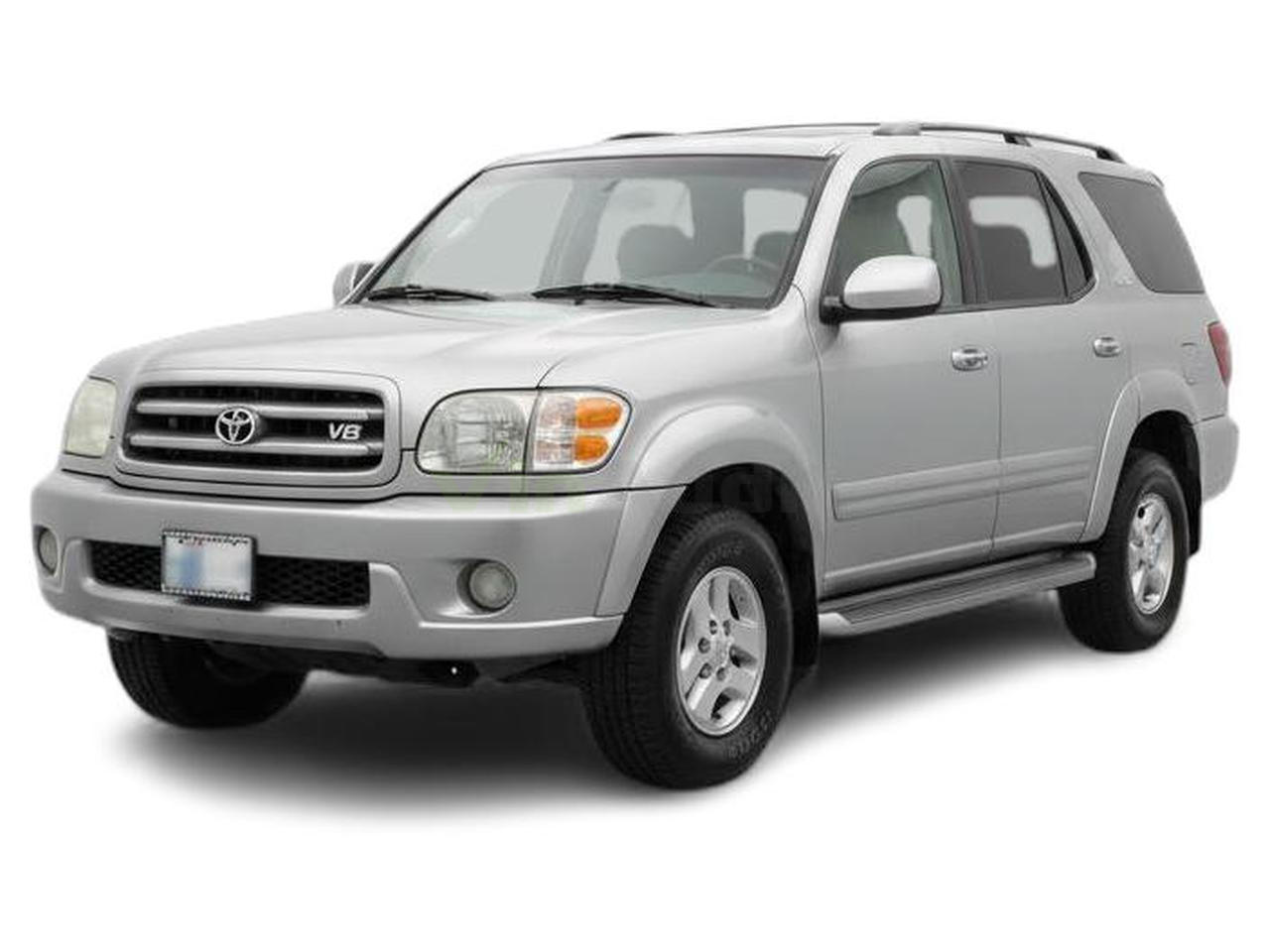The Good
The 2002 Sequoia offers a blend of practical advantages and emotional appeal. Its strong V8 provides capable performance and towing, while Toyota's legendary reliability offers peace of mind. The spacious interior and comfortable ride appeal to families, and the rugged design suggests adventure. While not the most fuel-efficient, its lasting value makes it an attractive choice.
The Bad
Potential weaknesses of the 2002 Sequoia include rust, especially in areas with road salt. The braking system, particularly the ABS, can be prone to issues. Fuel economy is not a strong suit. Check for timing belt service records, as neglecting this can lead to costly engine damage. Suspension components can also wear out over time.
2002 Toyota Sequoia: Quick Overview
Key specifications for the 2002 Toyota Sequoia:
- Engine Options: 4.7L 2UZ-FE V8
- Horsepower: 240 hp @ 4800 rpm
- Torque: 315 lb-ft @ 3400 rpm
- Fuel Economy: Approximately 14 mpg city / 17 mpg highway (may vary depending on driving conditions and vehicle condition)
- 0-60 Time: Around 8.5-9 seconds (estimated)
- Towing Capacity: Up to 6,200 lbs (depending on configuration)
- Trim-Level Features:
- SR5: Standard features include: Cloth upholstery, keyless entry, power windows and locks, AM/FM/CD stereo, alloy wheels, automatic climate control, antilock brakes (ABS), Vehicle Stability Control (VSC) system, and traction control. Optional features included: Upgrade audio system, sunroof, and leather seating.
- Limited: Includes SR5 features plus: Leather upholstery, upgraded JBL audio system, sunroof, heated front seats, automatic dimming rearview mirror, wood trim accents, and more luxurious interior appointments. Also typically included limited specific alloy wheel designs.
2002 Toyota Sequoia Specifications
Vehicle Information
| Year | 2002 |
| Make | Toyota |
| Model | Sequoia |
| Trim | - |
| Style | - |
| Type | - |
| Category | - |
Manufacturing Details
| Made In | - |
| Manufacturing City | - |
Dimensions
| Doors | - |
| Curb Weight | - |
| Gross Vehicle Weight Rating | - |
| Overall Height | - |
| Overall Length | - |
| Overall Width | - |
| Wheelbase Length | - |
| Standard Seating | - |
Engine & Performance
| Engine | - |
| Engine Size | - |
| Engine Cylinders | - |
| Transmission | - |
| Transmission Type | - |
| Transmission Speeds | - |
| Drivetrain | - |
Additional Features
| Anti-Brake System | - |
| Steering Type | - |
Pricing
| Manufacturer Suggested Retail Price (MSRP) | - |
| Invoice Price | - |
| Delivery Charges | - |
Vehicle History Report
Specifications
History
Events
History Check
Check
Check
Check
Check
Listings
Recalls
Check
Analysis
What Problems Does the 2002 Toyota Sequoia Have?
Timing belt replacement is crucial. The 4.7L V8 engine is an interference engine, meaning that if the timing belt breaks, severe engine damage can occur. The recommended replacement interval is typically around 90,000 miles. Neglecting this service is a major reliability concern.
Other common issues include: Power window regulator failures, worn suspension components (ball joints, control arm bushings), and occasional transmission issues (rough shifting). Older Sequoias may experience problems with the evaporative emissions (EVAP) system, leading to check engine lights.
Recalls for the 2002 Sequoia (check NHTSA.gov for the most up-to-date information) have included issues related to the spare tire carrier and potential airbag inflator problems (Takata recall).
Long-term reliability generally remains good if maintenance is performed diligently. However, age-related wear and tear will inevitably lead to increased repair needs as the vehicle accumulates mileage.
How long will the 2002 Toyota Sequoia last?
Long-term durability hinges on rust prevention and diligent timing belt replacements. Weaknesses over time include increased susceptibility to rust, worn suspension components, and potential electrical gremlins as wiring ages. Neglecting these aspects will significantly shorten the vehicle's lifespan.
What Technology & Safety Features are Included?
Safety features included standard antilock brakes (ABS), front airbags, and Vehicle Stability Control (VSC) and traction control. Optional features included side airbags on some models.
Optional features for entertainment included a rear-seat entertainment system with a DVD player and screen (typically on Limited models). Some models may have included a factory navigation system, although this was less common in 2002.
Crash test ratings from the NHTSA (National Highway Traffic Safety Administration) and IIHS (Insurance Institute for Highway Safety) should be consulted for specific scores. Generally, the Sequoia performed well in frontal crash tests for its size. However, side-impact protection was not as advanced as newer vehicles. It's important to note that safety technology has significantly advanced since 2002, so a modern vehicle would offer superior protection in a collision.
Given its age, the technology and safety features are dated compared to current vehicles, requiring buyers to prioritize reliability and space over modern conveniences.
What Colors Options are Available?
Exterior Colors
Interior Colors
2002 Toyota Sequoia Prices and Market Value
Depreciation has been significant, as expected for a vehicle of this age. Factors affecting resale value include: Rust-free condition (especially the frame), maintenance records, low mileage, and overall cosmetic appearance. Sequoias in excellent condition command a premium due to Toyota's reputation for longevity.
2002 Toyota Sequoia Cost of Ownership
2002 Toyota Sequoia Fuel Efficiency
2002 Toyota Sequoia Safety Rating
NHTSA
2002 Toyota Sequoia Insurance
reasonable repair costs.
How Does the 2002 Toyota Sequoia Compare to Other Vehicle?
Price-wise, a used Sequoia can be attractive compared to newer SUVs. However, considering age-related repairs, the total cost of ownership should be carefully evaluated.
Alternatives to consider, depending on your priorities: For better fuel economy, a newer crossover SUV might be a better choice. For similar reliability but more modern features, a later model Toyota 4Runner or Highlander could be considered, though they are smaller. If you need the full-size capability and are willing to accept higher running costs, the Sequoia remains a viable option, especially if found in excellent condition. The Nissan Armada offered comparable size and features, but its reliability is not as highly regarded as the Toyota. The Chevy Tahoe/Suburban offer similar capabilities, but can be less reliable and depreciate more quickly.
Ranks #175 SUV
| 1 | 2023 Toyota 4Runner | (5.0★) |
| 2 | 2023 Honda CR-V Hybrid | (5.0★) |
| 3 | 2023 Lexus GX | (0.0★) |
| 4 | 2024 Mazda CX-90 PHEV | (0.0★) |
| 5 | 2024 Subaru Crosstrek | (5.0★) |
| 6 | 2024 BMW iX | (0.0★) |
| 7 | 2023 Ford Bronco Sport | (3.0★) |
| 8 | 2023 Mercedes-Benz EQB | (0.0★) |
| 9 | 2024 Chevrolet Trax | (5.0★) |
| 10 | 2023 Audi A4 allroad | (0.0★) |
| 11 | 2023 Hyundai Kona N | (0.0★) |
| 12 | 2023 Nissan ARIYA | (5.0★) |
| 175 | 2002 Toyota Sequoia | (0.0★) |

